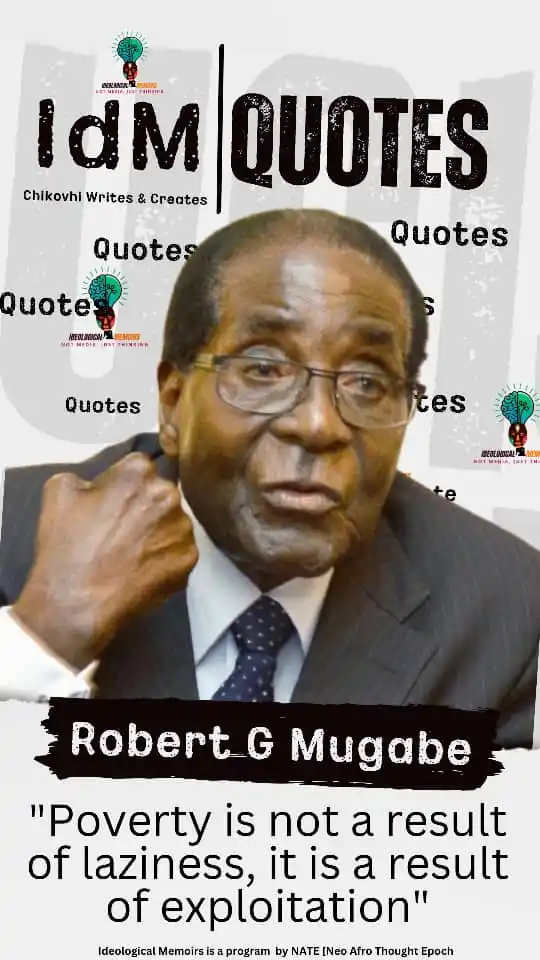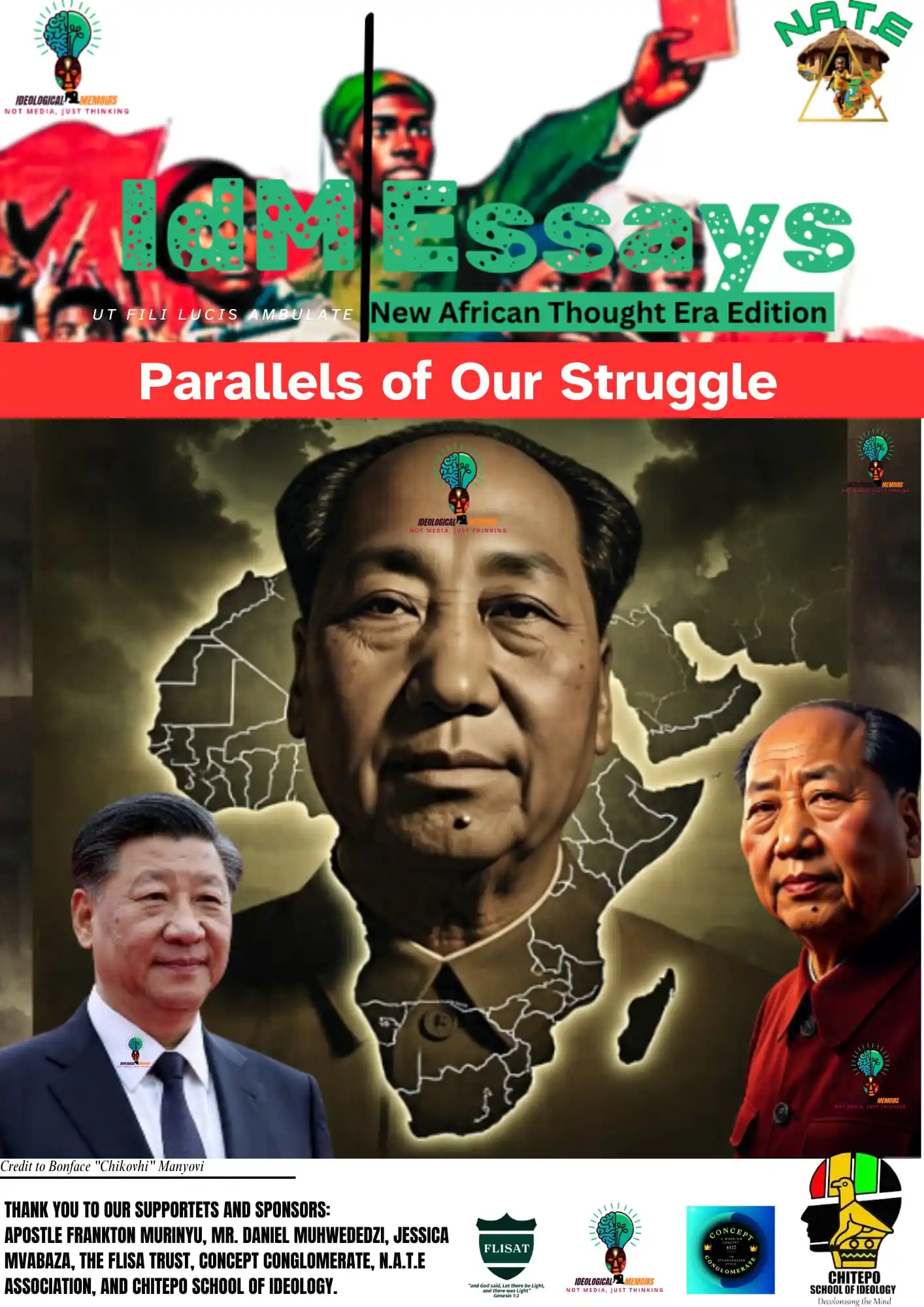
Ideological Memoirs
866 subscribers
About Ideological Memoirs
We are an Afro Libertarian and Democrat Nationalist leaning publication, publishing ideological essays commenting on the Socio-Political, Socio-cultural, and Socio-economic affairs of Zimbabwe, Africa, and the relevant World included. Offering our readership of idealists and ideological enthusiasts as such as you are, thought provoking pieces, to get by with, in this media crazy thinkless world. Yes! Sport, art, and literature are part of social interest, hence you'll too come into essays on it. Chikovhi writes here... +263 771 913 730
Similar Channels
Swipe to see more
Posts

*The first 100 years|America After Independence from Britain* -Remember that America was once a colony, then remember the first 100 years of their independence- Economic Struggles, Instability, and Wars. The 13 original states of the United States of America, in 1776 following the 1775 battles of Lexington and Concord, against their then colonial master Britain, they effectively accorded their purpose of war, with the Declaration of Independence. The thirteen former colonies, now new states, known as the United States of America, formed a continental army, led by George Washington, set to deliver the principles of liberty and self governance, across the rest of continental North America, against the British empire, with the help of the French Empire. Officially, the American Revolutionary War, is dated 1775 to 1783, with the decisive defeat of Red coat/British General, Charles Cornwallis' British forces, at York Town, in 1781, culminating in British surrender and the subsequent Treaty of Paris, which included the formal recognition of American independence in 1783. The assertion behind this essay is; *The first hundred years of former colonies, are years of growing pains.* *Reflection* The states under the 1783 officially recognized independent United States of America, they were still the original 13. However with time, others broke up to make more, others joined the union, others were adopted through war and imperial purchases into the union. This all followed in the course of the hundred years, counting from 1783 to 1883, whereby America saw through Westward expansion, tumultuous economic growth, civil war, reconstruction, economic struggles, and broad social changes. This same complex of growing pains, has over the last two centuries, 19th and 20th centuries, been share by independence achieving nations worldwide. As the focus with these essays often is with Africa, let me highlight some parallels of America's first 100 years, with those of in particular, our Fatherland republic of Zimbabwe. So to out of that, deduce the assertion behind this essay. Exploratively, allow for me to draw out, that colonies were systematically ran, and that included their administrative, economic, and legislative functions, henceforth when were deposed, and replaced with new nations, the often radical change left behind systematically collapsed templates to build from, for the new nations. *Compounding Reflection* The first hundred years after American independence were marked by significant economic struggles, instability, and wars. Here's some notable parallels with the Zimbabwean case of post independence growing pains, to reflect on: *Economic Struggles* : The American Revolution led to post war Economic fatigue, characterized in a significant economic decline, with estimates suggesting major drops in per-capita income between 1774 and 1790. The war disrupted trade, led to inflation, and resulted in a substantial national debt issue. *Articles of Confederation*: which is reported to be the first governing document of the United States. The Articles of Confederation, reportedly proved inadequate in managing the economy, or even navigating the Economic storms. The Economy was disheveled, largely disconnected from their new nation's Economic policies, this resulting in the difficulty in imposing taxes, regulate commerce, or enforce laws, leading to further financial instability. *Conflicts*: The young nation faced various conflicts, however for parallel purposes to Zimbabwe, i highlight the French and Colonial War legacies, that culminated in civil wars, and other notable skirmishes, some shortly after independence, others long into independence. These such characteristics of the first hundred years of American independence, led not to the independent nations' demise, however made part of its becoming of "superpower story". *Conclusion* Zimbabwe currently is seeing itself through this such tumultuous period of growing pains. It isn't a new concept with this essay, often the concept is discussed as that of "Maturing/Matured Democracy". Although contemporary, this observation is subject to political discourse, the country has for sure seen positive changes, alluding to growth towards its nation building goals. Growing pains have been a part of Zimbabwe's coming of independence story, since later into during the war for independence, till today. The points of discussion are plenty, however for anybody else, it must for sure be the point of whether our story is not going to be hijacked, and re-written to the benefit of somebody else, and not the Zimbabwean Povo. Which is a thought that reminds us of the continued relevance, of the words "Aluta continua"... Chikovhi wrote this. Thank you for reading!


*"Poverty is not a result of laziness, it is a result of exploitation"* [Robert G Mugabe] IdM|Quotes


*A rolling stone, gathers no moss* Meaning: Stability and Consistency, or meaningful adventure and risk taking, leads to the accumulation of meaningful benefit. IdM|Just Proverbs_


*Chairman Mao: Why Chinese Warfare Tactict, Was More Effective For Africa's Liberation Struggle* -The people are the water, you are the fish, henceforth you need them to keep alive, and with that your cause- Mao Zedong or Chairman Mao, he was a Communist Revolutionary, Politician, and a Socio-political theorist. Famously, Chairman Mao when he met a Deng Fangzhi, whom was a parent to a son whom had died serving in the Korean War [1950 - 1953], he expressed sympathy and shared in the bereavement, of too having also lost his own son, Mao Anying, whom he'd sent to serve in the same war. In the same breath Chairman Mao stated, his deep love for his late son, however an even deeper love for the people of China. This scenario, i set it as the hallmark, of firstly Chairman Mao's commitment to the revolution and the people, putting first the greater good over personal family ties. Then also as the hallmark, of the collective or shared ideology based warfare tactic, of the Chinese war machine, of that time. The assertion behind this essay is; *Guerilla Warfare, is an ideology, that can be applied to more than just bringing Revolution.* *Reflection* Ever heard of the so called "Century of Humiliation"? It is in relation to China, in particular the China before the People's Republic of China, in 1949. This "Century of Humiliation", is cited to had spanned the years 1839 to 1949, in that span, including the timeline of events from the Opium Wars [Characterised by European Invasion], right to the glorious ending of this dark chapter in Chinese history, with the 1949 Communist Party's seizure of power. So in recent discussion, related to the paralles of ZIPRA's Soviet influenced Warfare, and ZANLA's Chinese Influenced Warfare, the question became of what ideas could we observe as had charged behind each one philosophy. I elaborated that based on simply the backdrop, each war philosophy was founded from, one could easily tell apart why and how they were received in the African Liberation Struggle's context. Whilst Soviet warfare will have been founded and horned from the war against Tsar Nicholas II, whom was an internal enemy, henceforth limiting the Soviet struggle to simply one of class. Chinese Warfare was then more akin to the African context, founded and horned from the struggle for self determination, sovereignty, and other nationalist aspirations, in that including the class struggle, as well as the struggle against racism/superiority complex, with an invader/colonial enemy. *Compounding Reflection* ZIPRA had received its military support and training from the Soviets. The Soviets had a conventional military philosophy, that emphasized on conventional military tactics, based on armored warfare and artillery. Henceforth ZIPRA's approach focused on building a capable military force, for direct combat with Rhodesian Security Forces. In the while, ZANLA forces as will have received training and support from China, their military philosophy was that of Chinese guerilla warfare principles. Which these principles included, building a guerilla force, capable of wearing down the enemy, through prolonged war, based on tactics like ambushes, sabotage, and intelligence gathering. The emphasis being "The People's war", or mobilisation of the masses, for a protracted conflict. The latter philosophy resonated with the broader context of the African Liberation Struggle, which first and foremost, will have been broadly characterized by a lack of space and time, as well as resources to build a head on combat capable force, against a conventional military enemy, with conventional access to all needed resources. However as with the context of Zimbabwe, the duality of the war-fronts for the enemy, also will have told for a double headache, which will have attributed to our Revolutionary success. *Conclusion* Now to reel it back to the assertion here being explored; *Guerilla Warfare, is an ideology, that can be applied to more than just bringing Revolution.* This as it is a philosophy that emphasizes togetherness, towards a collective goal, with little resources. The rise out of the century of humiliation, is ongoing for China, that dark chapter remains the framework of a prolonged state of engagement in guerilla warfare philosophy. It can too be observed in our African homes today, where one child will go to school at the expense of efforts from everyone else at home, including their older sometimes younger siblings, to help them achieve success, all under the principle that they remember home, when they find economic success. If you haven't been observing that as a form of continued guerilla warfare against imperialism, start to do so, because our Economic Struggle is real, and someone said education is the key. Chikovhi wrote this. Thank you for reading!


*"Liberate the mind of a man, and ultimately you'll liberate him in the physical"* [Marcus Garvey] IdM|Quotes


*The lotus blooms most beautifully in muddy waters, yet remaining unsoiled* Meaning: Even adversity is not enough to deny brilliance. IdM|Just Proverbs


*"Unity is one with Victory"* [Samora Machel] IdM|Quotes


-Kuda mhandu Yako, akuzi kupusa- *You're not foolish to like your enemy* Meaning: to keep one's own enemies close, is strategic. IdM|Proverbs


*Money is a good servant, but a terrible master* Meaning: Live not by the cycles of money, however make the cycles count in how you spend them. IdM|African Proverbs












